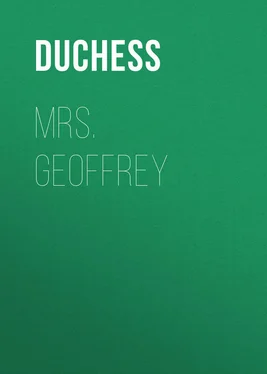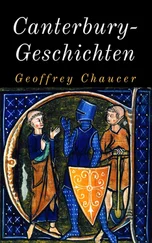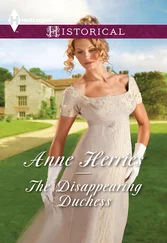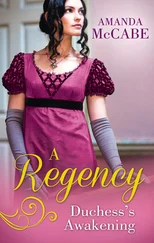Duchess - Mrs. Geoffrey
Здесь есть возможность читать онлайн «Duchess - Mrs. Geoffrey» — ознакомительный отрывок электронной книги совершенно бесплатно, а после прочтения отрывка купить полную версию. В некоторых случаях можно слушать аудио, скачать через торрент в формате fb2 и присутствует краткое содержание. Жанр: foreign_antique, foreign_prose, foreign_sf, на английском языке. Описание произведения, (предисловие) а так же отзывы посетителей доступны на портале библиотеки ЛибКат.
- Название:Mrs. Geoffrey
- Автор:
- Жанр:
- Год:неизвестен
- ISBN:нет данных
- Рейтинг книги:5 / 5. Голосов: 1
-
Избранное:Добавить в избранное
- Отзывы:
-
Ваша оценка:
- 100
- 1
- 2
- 3
- 4
- 5
Mrs. Geoffrey: краткое содержание, описание и аннотация
Предлагаем к чтению аннотацию, описание, краткое содержание или предисловие (зависит от того, что написал сам автор книги «Mrs. Geoffrey»). Если вы не нашли необходимую информацию о книге — напишите в комментариях, мы постараемся отыскать её.
Mrs. Geoffrey — читать онлайн ознакомительный отрывок
Ниже представлен текст книги, разбитый по страницам. Система сохранения места последней прочитанной страницы, позволяет с удобством читать онлайн бесплатно книгу «Mrs. Geoffrey», без необходимости каждый раз заново искать на чём Вы остановились. Поставьте закладку, и сможете в любой момент перейти на страницу, на которой закончили чтение.
Интервал:
Закладка:
"I wish I could see it!" says Geoffrey, longingly.
"Well so you can," returns she, kindly. "Any night when there is a good moon come to me and I will go with you to Carrickdhuve – that is the name of the hill – and show you the bay."
She looks at him quite calmly, as one might who sees nothing in the fact of accompanying a young man to the top of a high mountain after nightfall. And in truth she does see nothing in it. If he wishes to see the bay she loves so well, of course he must see it; and who so competent to point out to him all its beauties as herself?
"I wonder when the moon will be full," says Geoffrey, making this ordinary remark in an everyday tone that does him credit, and speaks well for his kindliness and delicacy of feeling, as well as for his power of discerning character. He makes no well-turned speeches about the bay being even more enchanting under such circumstances, or any orthodox compliment that might have pleased a woman versed in the world's ways.
"We must see," says Mona, thoughtfully.
They have reached the farm again by this time, and Geoffrey, taking up the guns he had left behind the hall door, – or what old Scully is pleased to call the front door in contradistinction to the back door, through which he is in the habit of making his exits and entrances, – holds out his hand to bid her good-by.
"Come in for a little while and rest yourself," says Mona, hospitably, "while I get the brandy and send it up to poor Kitty."
It strikes Geoffrey as part of the innate sweetness and genuineness of her disposition that, after all the many changes of thought that have passed through her brain on their return journey, her first concern on entering her own doors is for the poor unhappy creature in the cabin up yonder.
"Don't be long," he says, impulsively, as she disappears down a passage.
"I won't, then. Sure you can live alone with yourself for one minute," returns she, in very fine Irish; and, with a parting smile, sweet as nectar and far more dangerous, she goes.
When she is gone, Geoffrey walks impatiently up and down the small hall, conflicting emotions robbing him of the serenity that usually attends his footsteps. He is happy, yet full of a secret gnawing uneasiness that weighs upon him daily, hourly. Near Mona – when in her presence – a gladness that amounts almost to perfect happiness is his; apart from her is unrest. Love, although he is but just awakening to the fact, has laid his chubby hands upon him, and now holds him in thrall; so that no longer for him is that most desirable thing content, – which means indifference. Rather is he melancholy now and then, and inclined to look on life apart from Mona as a doubtful good.
For what, after all, is love, but
"A madness most discreet,
A choking gall, and a preserving sweet?"
There are, too, dispassionate periods, when he questions the wisdom of giving his heart to a girl lowly born as Mona undoubtedly is, at least on her father's side. And, indeed, the little drop of blue blood inherited from her mother is so faint in hue as to be scarcely recognizable by those inclined to cavil.
And these he knows will be many: there would be first his mother, and then Nick, with a silent tongue but brows uplifted, and after them Violet, who in the home circle is regarded as Geoffrey's "affinerty," and who last year was asked to Rodney Towers for the express purpose (though she knew it not) of laying siege to his heart and bestowing upon him in return her hand and – fortune. To do Lady Rodney justice, she was never blind to the fortune!
Yet Violet, with her pretty, slow, trainante voice and perfect manner, and small pale attractive face, and great eyes that seem too earnest for the fragile body to which they belong, is as naught before Mona, whose beauty is strong and undeniable, and whose charm lies as much in inward grace as in outward loveliness.
Though uncertain that she regards him with any feeling stronger than that of friendliness (because of the strange coldness that she at times affects, dreading perhaps lest he shall see too quickly into her tender heart), yet instinctively he knows that he is welcome in her sight, and that "the day grows brighter for his coming." Still, at times this strange coldness puzzles him, not understanding that
"No lesse was she in secret heart affected,
But that she masked it in modestie,
For feare she should of lightnesse be detected."
For many days he had not known "that his heart was darkened with her shadow." Only yesterday he might perhaps have denied his love for her, so strange, so uncertain, so undreamt of, is the dawning of a first great attachment. One looks upon the object that attracts, and finds the deepest joy in looking, yet hardly realizes the great truth that she has become part of one's being, not to be eradicated until death or change come to the rescue.
Perhaps Longfellow has more cleverly – and certainly more tenderly – than any other poet described the earlier approaches of the god of Love, when he says, —
"The first sound in the song of love
Scarce more than silence is, and yet a sound.
Hands of invisible spirits touch the strings
Of that mysterious instrument, the soul,
And play the prelude of our fate."
For Geoffrey the prelude has been played, and now at last he knows it. Up and down the little hall he paces, his hands behind his back, as his wont when deep in day-dreams, and asks himself many a question hitherto unthought of. Can he – shall he – go farther in this matter? Then this thought presses to the front beyond all others: – "Does she – will she – ever love me?"
"Now, hurry, Bridget," says Mona's low soft voice, – that "excellent thing in woman." "Don't be any time. Just give that to Kitty, and say one prayer, and be back in ten minutes."
"Law, Miss Mona, ye needn't tell me; sure I'm flyin' I'll be there an' back before ye'll know I'm gone." This from the agile Biddy, as (exhilarated with the knowledge that she is going to see a corpse) she rushes up the road.
"Now come and see my own room," says Mona, going up to Rodney, and, slipping her hand into his in a little trustful fashion that is one of her many, loving ways, she leads him along the hall to a door opposite the kitchen. This she opens, and with conscious pride draws him after her across its threshold. So holding him, she might at this moment have drawn him to the world's end, – wherever that may be!
It is a very curious little room they enter, – yet pretty, withal, and suggestive of care and affection, and certainly not one to be laughed at. Each object that meets the view seems replete with pleasurable memory, – seems part of its gentle mistress. There are two windows, small, and with diamond panes like the parlor, and in the far end is a piano. There are books, and some ornaments, and a huge bowl of sweetly-smelling flowers on the centre-table, and a bracket or two against the walls. Some loose music is lying on a chair.
"Now I am here, you will sing me something," says Geoffrey, presently.
"I wonder what kind of songs you like best," says Mona, dreamily, letting her fingers run noiselessly over the keys of the Collard. "If you are like me, you like sad ones."
"Then I am like you?" returns he, quickly.
"Then I will sing you a song I was sent last week," says Mona, and forthwith sings him "Years Ago," mournfully, pathetically, and with all her soul, as it should be sung. Then she gives him "London Bridge," and then "Rose-Marie," and then she takes her fingers from the piano and looks at him with a fond hope that he will see fit to praise her work.
"You are an artiste," says Geoffrey, with a deep sigh when she has finished. "Who taught you, child? But there is no use in such a question. Nobody could teach it to you: you must feel it as you sing. And yet you are scarcely to be envied. Your singing has betrayed to me one thing: if ever you suffer any great trouble it will kill you."
Читать дальшеИнтервал:
Закладка:
Похожие книги на «Mrs. Geoffrey»
Представляем Вашему вниманию похожие книги на «Mrs. Geoffrey» списком для выбора. Мы отобрали схожую по названию и смыслу литературу в надежде предоставить читателям больше вариантов отыскать новые, интересные, ещё непрочитанные произведения.
Обсуждение, отзывы о книге «Mrs. Geoffrey» и просто собственные мнения читателей. Оставьте ваши комментарии, напишите, что Вы думаете о произведении, его смысле или главных героях. Укажите что конкретно понравилось, а что нет, и почему Вы так считаете.












